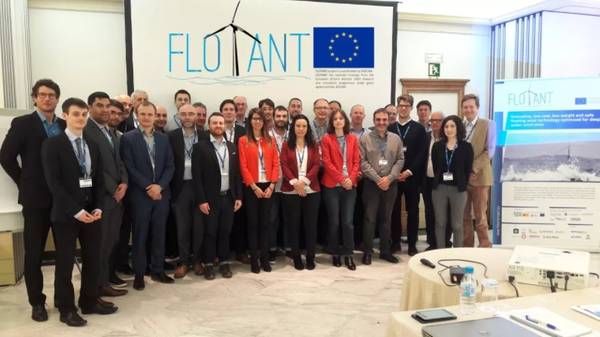
EUHorizon 2020-backed Flotant project has successfully validated an innovative dynamic cable concept for deepwater floating wind projects, unlocking the potential for greater wind power resources at lower cost.
The project consortium aims to develop conceptual and basic engineering for a hybrid concrete-plastic floating windfarm, looking at innovative solutions for anchoring and mooring systems, and dynamic cabling, including performance testing. Its objective is to improve cost-efficiency and increase robustness and flexibility in floating wind subsea design for deeper waters from 100 to 600 meters.
Consortium partners Innosea, an AqualisBraemar LOC Group ASA (ABL Group) company, Hellenic Cables, ITA and University of Exeter have completed the dynamic cable scope of work.
Hellenic Cables and ITA designed and engineered a novel braided armor to protect the cross-section of the dynamic cable.
This included the application of an outer jacket made of carbon fibre reinforced composite, in addition to the development of a solution for sensor integration and interconnection of fiberoptic sensors for structural condition monitoring.
Dr. Ayoze Castro, head of the Innovation unit of the Oceanic Platform of the Canary Islands (PLOCAN), is the project coordinator of the project.
It includes 17 partners from eight countries, including Innosea, which was appointed to the consortium to provide a range of services across six of the consortium’s work packages – including for the dynamic cable and export system optimization.
Innosea was responsible for the configuration analysis of the dynamic cable, while testing and validation of mooring and dynamic cables was conducted at the Dynamic Marine Component (DMaC) of the University of Exeter, UK.
The next phase of the project for Innosea will be to finalize the floater global performance analyses to confirm its suitability versus project defined sites.
Prof. Lars Johanning of The University of Exeter said: “Floating offshore wind (FOW) power will be a vital component of the EU strategy as we move toward a net zero economy. It will also have a profound effect on the local economies in European countries, creating new jobs in the supply chain and providing a key component for our post-pandemic recovery. The development of reliable highly dynamic power cables will be an essential part of the emerging FOW industry and we are encouraged through the innovation development that have been achieved within Flotant."



